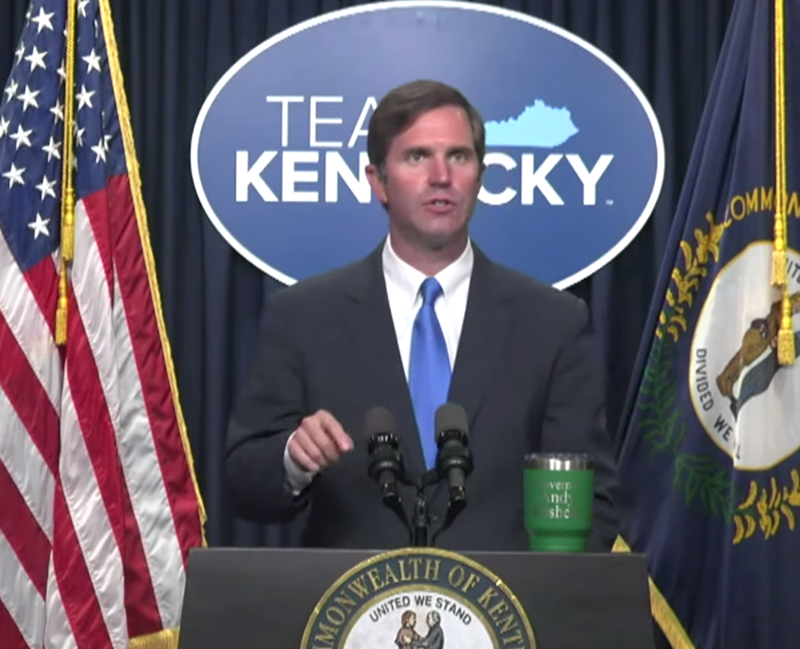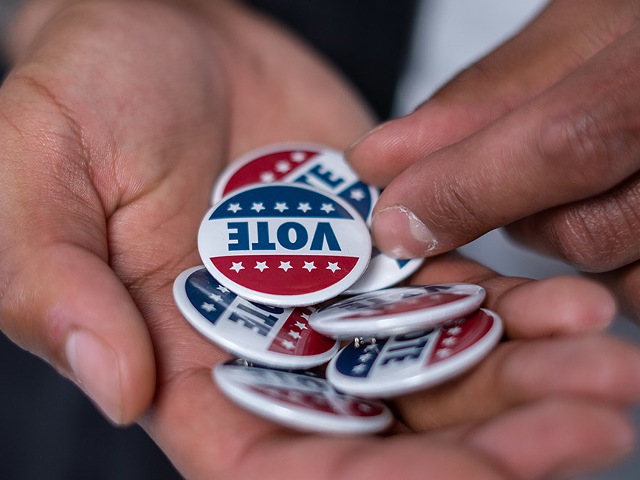Days after Kentucky Gov. Andy Beshear’s executive order granting preemptive pardons for medical marijuana obtained out of state went into place on Jan. 1, confusion about how the order functionally operates continues, raising fears that Kentuckians legitimately seeking medical marijuana could still face criminal consequences.
One element potentially contributing to that confusion are the “palm cards” Beshear said would be distributed to law enforcement officers across the state to provide guidance on the executive order and what to do if they encountered someone with medical marijuana in their possession.
One element potentially contributing to that confusion are the “palm cards” Beshear said would be distributed to law enforcement officers across the state to provide guidance on the executive order and what to do if they encountered someone with medical marijuana in their possession.
Through open records requests, LEO Weekly obtained copies of the palm card earlier this week. The palm card tells law enforcement officers that the person needs a “document from a physician” diagnosing them with one of 21 medical conditions, but does not describe what that document should look like. The lingering vagueness of the executive order and the palm card heightens concerns that people seeking cannabis out of state could still run into trouble.
“To me, everything’s going to fall in the hands of the police officer, what they feel like doing that day,” said C.J. Carter, state director for Minorities for Medical Marijuana. “It’s totally up to them being that there aren’t too many guidelines that they’re aware of that they have to follow.”
Beshear’s Nov. 15 executive order proactively issues pardons for marijuana possession so long as the person has one of 21 qualifying medical conditions, legally purchased the marijuana in another state, has a “written certification” from a doctor diagnosing the medical condition, has a receipt for the purchase of the marijuana and has less than eight ounces in their possession. Under the executive order, the pardons were extended to caregivers as well.
“The executive order isn’t going to make it convenient for anyone on the medical marijuana front; what it will ensure is that they’re not a criminal,” said Beshear on Dec. 29 ahead of the order taking effect.
For Kentuckians seeking medical marijuana out of state who are stopped by law enforcement officers, the palm cards are meant to be a bulwark between them and criminal charges.
The palm card acts as a checklist for officers, listing things the person they stopped will need to be in compliance with the executive order, including the “document from a physician.”
In addition to the unclear language about “documents,” the palm card also does not mention what happens if a caregiver procures marijuana for a patient by themselves and is stopped, despite the text of the executive order extending pardon protection to caregivers. Instead, after the words “information for caregivers,” the card includes the website of the governor’s Medical Cannabis Advisory Committee, which includes links to press conferences, information about the committee and the executive order, which does contain information on caregivers.)
“To me, everything’s going to fall in the hands of the police officer, what they feel like doing that day,” said C.J. Carter, state director for Minorities for Medical Marijuana. “It’s totally up to them being that there aren’t too many guidelines that they’re aware of that they have to follow.”
Beshear’s Nov. 15 executive order proactively issues pardons for marijuana possession so long as the person has one of 21 qualifying medical conditions, legally purchased the marijuana in another state, has a “written certification” from a doctor diagnosing the medical condition, has a receipt for the purchase of the marijuana and has less than eight ounces in their possession. Under the executive order, the pardons were extended to caregivers as well.
“The executive order isn’t going to make it convenient for anyone on the medical marijuana front; what it will ensure is that they’re not a criminal,” said Beshear on Dec. 29 ahead of the order taking effect.
Unclear language about “documents”
In addition to the unclear language about “documents,” the palm card also does not mention what happens if a caregiver procures marijuana for a patient by themselves and is stopped, despite the text of the executive order extending pardon protection to caregivers. Instead, after the words “information for caregivers,” the card includes the website of the governor’s Medical Cannabis Advisory Committee, which includes links to press conferences, information about the committee and the executive order, which does contain information on caregivers.)
Beshear has previously said said palm cards would be handed out to law enforcement across the state by Jan. 1. The governor’s office did not respond to questions sent on Tuesday about the executive order from LEO Weekly, including a question about whether all law enforcement in Kentucky received the palm cards yet.
Without any standardized documentation, Carter worries that people will fabricate documents to smuggle marijuana into Kentucky, giving medical marijuana a black eye in the state; Kungu Njuguna, a policy strategist with the ACLU of Kentucky, worries that without additional guidance or standardization, law enforcement officers might view legitimate documents diagnosing qualifying illnesses as fake.
The executive order provides little more clarity on what kind of documents patients need: It says that in the signed and dated certification the doctor must list their name, address, telephone number and license number along with their diagnosis of the patient, but it does not specify a format for the document to be in. The executive order also does not mandate that the physician prescribe or otherwise recommend marijuana.
Unlike states that have legalized only medical marijuana, there is no state-issued card or other form of patient registration for Kentuckians seeking cannabis.
Without any standardized documentation, Carter worries that people will fabricate documents to smuggle marijuana into Kentucky, giving medical marijuana a black eye in the state; Kungu Njuguna, a policy strategist with the ACLU of Kentucky, worries that without additional guidance or standardization, law enforcement officers might view legitimate documents diagnosing qualifying illnesses as fake.
The executive order provides little more clarity on what kind of documents patients need: It says that in the signed and dated certification the doctor must list their name, address, telephone number and license number along with their diagnosis of the patient, but it does not specify a format for the document to be in. The executive order also does not mandate that the physician prescribe or otherwise recommend marijuana.
Unlike states that have legalized only medical marijuana, there is no state-issued card or other form of patient registration for Kentuckians seeking cannabis.
“It’s just a piece of paper. It can be forged. It can be typed up on its own. It’s not an official document; it doesn’t come directly from the state,” said Carter.
That lack of clarity over documents is accompanied by a broader misunderstanding about what the executive order actually does, with some people even believing it has legalized the drug, advocates say.
“There’s a lot of confusion. We hope that it gets a few things straightened out through trial and error, and hopefully it doesn’t ruin lives in the process,” said Matthew Bratcher, the executive director of the Kentucky chapter of the National Organization for the Reform of Marijuana Laws. “People might have the wrong information or misunderstand what the executive order is really about.”
He added: “It’s still illegal. You go to another state and you purchase cannabis at your own risk. You travel across state lines at your own risk. You have it on your person at your own risk. They [law enforcement] may have these palm cards, but they can still just arrest you and deal with all the document stuff in the courts.”
Currently, Illinois is the only state neighboring Kentucky where Kentuckians can procure cannabis in line with the executive order.
Ray O’Neal is the chief of police in Marion, a small Western Kentucky town that is joined to Cave-In-Rock, Illinois, where recreational marijuana is legal, by a free ferry that traverses the Ohio River. He told LEO Weekly he received electronic copies of the palm cards and printed out and distributed them to his officers by the time the executive order went into effect on Jan. 1. So far, none of his officers have run into a situation that required them to use the cards.
“We’ll go by the checklist on the card,” he said. “If there’s something that’s a little bit in a gray area, we’ll get in touch with our county attorney and discuss it with him.”
Representatives of several other law enforcement departments in communities along the Kentucky-Illinois border, as well as the Louisville Metro Police Department, did not respond to questions about the executive order and its enforcement from LEO Weekly.
Until Beshear’s executive order, Kentucky was one of just 13 states with a total prohibition on marijuana. The governor has called for the General Assembly to pass a bill legalizing medical marijuana during this year’s legislative session. For now, advocates of medical marijuana are left waiting for more clarity — or for action from the legislature.
“There are a lot of questions and unanswered questions and pitfalls for individuals who are driving to other states to get cannabis,” said Njuguna, the ACLU of Kentucky policy strategist.
This story was originally published by LEO Weekly, CityBeat's sister publication.
Coming soon: CityBeat Daily newsletter. We’ll send you a handful of interesting Cincinnati stories every morning. Subscribe now to not miss a thing. That lack of clarity over documents is accompanied by a broader misunderstanding about what the executive order actually does, with some people even believing it has legalized the drug, advocates say.
“There’s a lot of confusion. We hope that it gets a few things straightened out through trial and error, and hopefully it doesn’t ruin lives in the process,” said Matthew Bratcher, the executive director of the Kentucky chapter of the National Organization for the Reform of Marijuana Laws. “People might have the wrong information or misunderstand what the executive order is really about.”
He added: “It’s still illegal. You go to another state and you purchase cannabis at your own risk. You travel across state lines at your own risk. You have it on your person at your own risk. They [law enforcement] may have these palm cards, but they can still just arrest you and deal with all the document stuff in the courts.”
Currently, Illinois is the only state neighboring Kentucky where Kentuckians can procure cannabis in line with the executive order.
Ray O’Neal is the chief of police in Marion, a small Western Kentucky town that is joined to Cave-In-Rock, Illinois, where recreational marijuana is legal, by a free ferry that traverses the Ohio River. He told LEO Weekly he received electronic copies of the palm cards and printed out and distributed them to his officers by the time the executive order went into effect on Jan. 1. So far, none of his officers have run into a situation that required them to use the cards.
“We’ll go by the checklist on the card,” he said. “If there’s something that’s a little bit in a gray area, we’ll get in touch with our county attorney and discuss it with him.”
Representatives of several other law enforcement departments in communities along the Kentucky-Illinois border, as well as the Louisville Metro Police Department, did not respond to questions about the executive order and its enforcement from LEO Weekly.
Until Beshear’s executive order, Kentucky was one of just 13 states with a total prohibition on marijuana. The governor has called for the General Assembly to pass a bill legalizing medical marijuana during this year’s legislative session. For now, advocates of medical marijuana are left waiting for more clarity — or for action from the legislature.
“There are a lot of questions and unanswered questions and pitfalls for individuals who are driving to other states to get cannabis,” said Njuguna, the ACLU of Kentucky policy strategist.
This story was originally published by LEO Weekly, CityBeat's sister publication.
Follow us: Google News | NewsBreak | Reddit | Instagram | Facebook | Twitter






